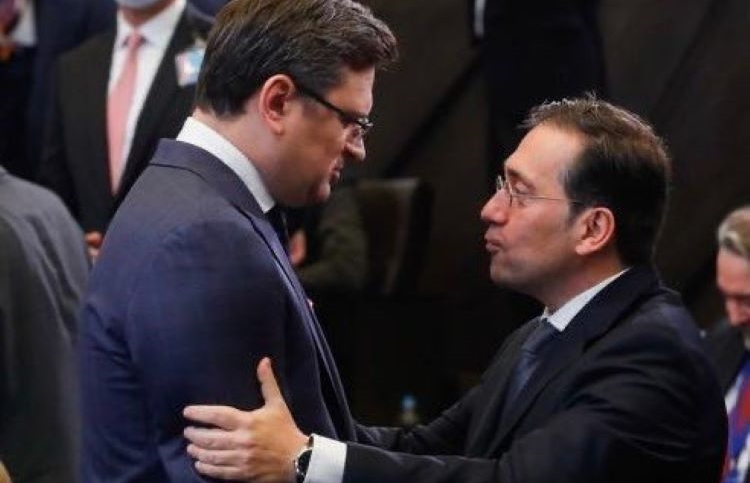The Diplomat
Foreign Minister José Manuel Albares assured yesterday that NATO sending heavy weapons to Ukraine “is not on the table right now”, despite the requests made in this regard by the Kiev authorities during the ministerial meeting of the Alliance.
“We make decisions in concert and that is not on the table right now,” the minister told the press on the occasion of the meeting of NATO foreign ministers held on April 6-7 in Brussels, after his Ukrainian counterpart, Dimitro Kuleba, asked the allies to send aircraft, anti-ship missiles, armored personnel carriers and heavy air defense systems.
Both Kuleba and NATO itself warned yesterday that one would have to start not differentiating between offensive and defensive material in the case of the Ukrainian conflict, a change of criteria that could facilitate the sending of battle tanks to fight Russian forces. “It is true that one tends to differentiate military material into defensive or offensive, but I think the real difference is in whose hands it is: all military material in the hands of Vladimir Putin’s army is offensive and all military material in the hands of the Ukrainian Army is defensive to defend its democracy, its territorial integrity, its sovereignty and defenseless civilians,” said Albares. “Spain is already helping with military material, with humanitarian aid, with sanctions, with political support; we are in the front line of all the decisions being taken by the Europeans and transatlantic allies, the last one, expelling 27 diplomats from Spain,” the minister added.
In addition, Albares met yesterday at NATO headquarters with Kuleba to convey to him “the support, commitment and solidarity of Spain and the Spanish people with Ukraine and its citizens” and to assure him that Spain “will now do everything possible” so that his country “can survive”. He also held a meeting with the US Secretary of State, Antony Blinken, also in the margins of the NATO meeting. “United in the defense of Ukraine. Preparing for the Madrid NATO Summit in June,” he stated via his Twitter. “Appreciate Spain’s unwavering support in holding Russia accountable and pressing President Putin to end his unjustified and unprovoked war of choice against Ukraine”, Blinken declared through the same social network.
Stoltenberg, Borrell and the new EU sanctions
NATO, as such, has warned that it will not send troops on the ground or enforce a no-fly zone, but allied countries are bilaterally providing anti-aircraft and anti-tank weapons, as well as medical equipment and supplies. At a press conference yesterday, the Secretary General of the Atlantic Alliance, Jens Stoltenberg, declared that “NATO allies are providing many different types of weapons, including heavier systems, advanced systems and also systems that can shoot down aircraft”, although he specified that it is not the Alliance that is sending this weaponry, but individual member states.
Stoltenberg also explained that, during the ministers’ meeting, the allies “fully condemned the horrific killings of civilians in Bucha and other places recently liberated from Russian control” and supported “efforts for an international investigation.” The ministers also agreed that “NATO’s next Strategic Concept should provide an answer on how we engage with Russia in the future and, for the first time, should also take into account how China’s growing influence and coercive policies affect our security.” “The Strategic Concept will be finalized for the Madrid Summit in June and will be the roadmap for the Alliance’s continued adaptation for the more dangerous and competitive world in which we live,” he added.
For his part, the European Union’s High Representative for Foreign and Security Policy, Josep Borrell, insisted upon his arrival at the NATO meeting that Ukraine needs “more weapons, less applause and more weapons.” “What is important are the practical issues, more resources, more military capacity to resist Russian aggression,” added the former Spanish minister, who also announced that the Council of EU foreign ministers will start discussing next Monday in Brussels on the possibility of imposing new sanctions on Russian gas and oil.
Precisely, the European Parliament yesterday approved, by a large majority, a resolution to call for more sanctions on Russia, including the “total and immediate embargo on Russian imports of oil, coal, nuclear fuel and gas”. This measure should be accompanied by a plan to continue to ensure the security of the Union’s energy supply and a strategy to “lift each of the sanctions in the event that Russia takes steps to restore the independence, sovereignty and territorial integrity of Ukraine within its internationally recognized borders and completely withdraw its troops from the territory of Ukraine”.






